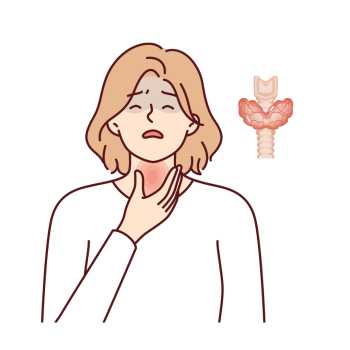Thyroid
Best Thyroid Treatment in Bangalore

Our clinic offers the Best Thyroid Treatment in Bangalore, providing high-quality care for a wide range of thyroid conditions. With the expertise of Dr. Siri Kamath, a renowned general physician and diabetologist, we deliver personalized treatment options to meet each patient’s unique needs. Whether you are dealing with Hypothyroidism or Hyperthyroidism, our clinic is recognized among the Best Hospitals for Thyroid Treatment in Bangalore. We understand that thyroid disorders can affect your quality of life, so we focus on comprehensive care that helps you get back to feeling your best.
What is the Thyroid?
The Thyroid is a small, butterfly-shaped gland located at the base of your neck, responsible for producing hormones that regulate metabolism, energy, and overall health. Thyroid disorders, such as Hypothyroidism and Hyperthyroidism, can cause serious health issues if not diagnosed and treated early. Proper management by a Thyroid Specialist is essential to restoring balance and ensuring your well-being.
Symptoms of Thyroid Disorders
Thyroid disorders can manifest through a variety of symptoms, which vary depending on the condition. Early recognition of these symptoms is crucial for receiving prompt treatment.
- Fatigue: Feeling unusually tired or drained, this is common in Hypothyroidism.
- Weight Gain: Unexplained weight gain even without changes in diet or activity levels.
- Feeling Cold: Increased sensitivity to cold, which is often linked to thyroid hormone deficiency.
- Weight Loss: Unexpected weight loss, usually related to Hyperthyroidism.
- Rapid Heartbeat: Palpitations or an unusually fast heartbeat, a symptom of hyperthyroidism.
- Anxiety: Feelings of nervousness or anxiety, which may be associated with hyperthyroidism.
By identifying these symptoms early and consulting with a Thyroid Specialist Doctor in Bangalore, patients can achieve better outcomes with timely intervention.
Causes of Thyroid Disorders
Understanding the underlying causes of thyroid disorders helps in determining the best course of treatment.
- Autoimmune Diseases: Conditions like Hashimoto’s Thyroiditis or Graves’ disease can trigger thyroid dysfunction.
- Iodine Deficiency: Low iodine levels can lead to thyroid conditions like Goiter or hypothyroidism.
- Genetic Factors: A family history of thyroid disorders increases your risk.
- Medications: Certain medications, like lithium or amiodarone, can interfere with thyroid function.
- Radiation Exposure: Exposure to radiation, especially in the neck region, can lead to thyroid problems.
- Surgical History: Past surgeries involving the thyroid can also affect its function.
By identifying the root cause, our Thyroid Specialist offers targeted treatments to restore your thyroid health.
Prevention of Thyroid Disorders
There are several steps you can take to prevent thyroid disorders and maintain optimal thyroid function:
- Balanced Diet: Eating foods rich in iodine, selenium, and zinc, such as seafood and dairy, supports thyroid health.
- Regular Check-Ups: Scheduling regular appointments with a Thyroid Specialist doctor near me allows for early detection and management.
- Routine Screenings: Periodic screenings are important, especially if you have a family history of thyroid conditions.
- Stress Management: Reducing stress through activities like meditation can support better thyroid function.
- Avoid Excess Iodine: While iodine is important, too much can cause thyroid issues. Follow medical advice to keep intake balanced.
Laser Thyroid Treatment
Laser thyroid treatment is a modern, minimally invasive option for managing thyroid disorders, such as Hypothyroidism and Hyperthyroidism. This advanced procedure delivers precise, targeted treatment with minimal discomfort, making it a preferred choice for those looking for the Best Thyroid Treatment in Banashankari. It offers faster recovery, reduced risk of complications, and a quicker return to daily activities.
Advantages of Laser Thyroid Treatment:
- Minimal Discomfort: The procedure is less invasive, causing less pain.
- Quick Recovery: Most patients can return to daily activities sooner than with traditional surgery.
- Reduced Risk: Fewer complications due to the precision of the laser.
- Effective Results: Offers long-lasting results for managing thyroid issues.
Thyroid Specialist in Bangalore
Dr. Siri Kamath is a leading Thyroid Specialist Doctor in Banashankari, with extensive experience treating thyroid disorders. Known for his personalized approach, Dr. Siri Kamath provides comprehensive care to ensure the best possible outcomes. If you are looking for the Best Thyroid Specialist in JP nagar, Dr. Siri Kamath is here to help you regain your health and confidence.
Conclusion
For those in search of the Best Thyroid Treatment in Bangalore, look no further. Dr. Siri Kamath offers expert care, advanced treatments, and personalized solutions for all your thyroid needs. Book your appointment today and take the first step toward better thyroid health.
FAQs
What is the best treatment for thyroid disorders?
At our clinic, Dr. Siri Kamath offers personalized treatment options for both Hypothyroidism and Hyperthyroidism, using the latest advancements in thyroid care.
What are the symptoms of hypothyroidism?
At our clinic, Dr. Siri Kamath offers personalized treatment options for both Hypothyroidism and Hyperthyroidism, using the latest advancements in thyroid care.
Who is the best thyroid specialist doctor?
Dr. Siri Kamath is considered one of the Best Thyroid Specialists in Bangalore, offering expert care for thyroid issues.
How are thyroid disorders diagnosed?
Diagnosis typically involves blood tests to check hormone levels and may include imaging tests to assess the thyroid gland.
How can I prevent thyroid disorders?
Prevention involves a balanced diet, routine check-ups, and managing stress. Consulting a Thyroid Specialist for regular screenings is also essential.
Fill the Form. We will Contact You Soon!
